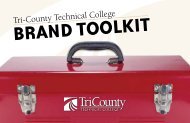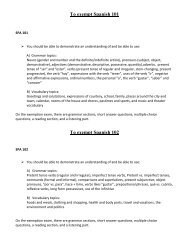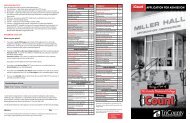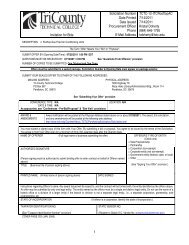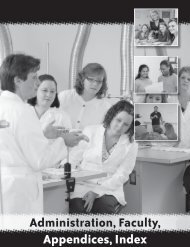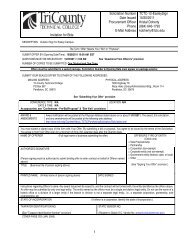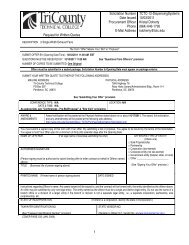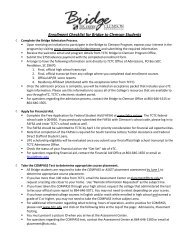TCTC Catalog - Tri-County Technical College
TCTC Catalog - Tri-County Technical College
TCTC Catalog - Tri-County Technical College
Create successful ePaper yourself
Turn your PDF publications into a flip-book with our unique Google optimized e-Paper software.
Course Descriptions<br />
COURSE<br />
DESCRIPTIONS<br />
118<br />
Numbering System Example: (2-6-4)<br />
2 - Number of class hours per week<br />
6 - Number of lab hours per week<br />
4 - Credits awarded<br />
TEX 211 Textile Process—Spin/Weave (1-3-2)<br />
This course is a survey of machinery and process of textile<br />
manufacturing with special emphasis on spinning and weaving.<br />
TEX 212 Textile Process—Lab Test (1-3-2)<br />
This course is a survey of the testing equipment used to perform<br />
laboratory tests of materials in each textile process. Students<br />
will get hands-on experience by analyzing products from<br />
each of the processes. This will be accomplished by use of a<br />
team project. Prerequisite: TEX 101 or TEX 102.<br />
TEX 221 Textile Cost and Analysis (4-0-4)<br />
This course covers the principles of costing as they apply to<br />
the manufacture of textiles, including allocation of cost of<br />
materials, labor, and overhead; determining the unit cost of<br />
yarns, fabrics, and finishes; inventory systems; storage; and<br />
material handling. Prerequisite: TEX 102 or TEX 202.<br />
TEX 233 Textile Supervision (3-0-3)<br />
This course covers the principles, concepts, and techniques<br />
concerned with effective and efficient utilization of personnel.<br />
Emphasis is placed on leadership and human behavior as they<br />
relate to employer-employee relationships. Includes teaming<br />
and problem-solving situations.<br />
(VET)—VETERINARY TECHNOLOGY<br />
VET 101 Animal Breeds and Husbandry (2-3-3)<br />
This course is a study of the various species and breeds of<br />
domestic animals commonly encountered in veterinary medicine.<br />
Emphasis is placed on the recognition of each breed as<br />
well as important terminology, physiological data, and behavior<br />
of each species of animal.<br />
VET 103 Veterinary Medical Terminology (2-0-2)<br />
This course introduces the fundamental principles of veterinary<br />
medical terminology. This systems approach to building<br />
the medical vocabulary is designed to complement anatomy,<br />
physiology, pathology, and related areas of veterinary medicine.<br />
VET 104 Veterinary Anatomy and Physiology (2-3-3)<br />
This course provides a general survey of the functional anatomy<br />
and physiology of the domestic animals commonly encountered<br />
in veterinary medicine. Dissection of representative cadavers<br />
is performed in the laboratory. Corequisite: VET 103.<br />
VET 105 Orientation to Veterinary Technology(1-0-1)<br />
This course is a study of the different job opportunities for a<br />
veterinary technician. In addition, the course exposes the student<br />
to key characteristics of people who are successful in the<br />
field.<br />
VET 115 Pharmacology and Anesthesiology (3-3-4)<br />
This course is a study of the drugs and medical substances of<br />
veterinary importance, including characteristics, classification,<br />
and usage. This course includes a detailed study of anesthesia<br />
and anesthetic agents. Prerequisite: VET 104. Corequisite: VET<br />
116.<br />
VET 116 Radiology and Parasitology (2-3-3)<br />
This course is a study of the radiologic techniques for all domestic<br />
animals in veterinary medicine, including taking, developing,<br />
and assessing for technical errors of radiographs of<br />
large and small animals. This course also includes a survey<br />
and laboratory study of domestic animal parasitology.<br />
Corequisite: VET 115.<br />
VET 150 Clinical Techniques I (2-3-3)<br />
This is the first in a series of courses which include a survey of<br />
the technical skills required by the veterinary technician in<br />
dealing with all domestic animals. The course includes, but is<br />
not limited to, techniques in restraint, handling, administration<br />
of medications, and collection of bodily specimens.<br />
Corequisite: VET 104.<br />
VET 152 Clinical Pathology (2-6-4)<br />
This course provides a study of veterinary hematology, urology,<br />
and clinical chemistry followed by application of standard<br />
laboratory procedures and regulatory testing in each of these<br />
disciplines. Prerequisite: VET 150. Corequisite: VET 116.<br />
VET 160 Clinical Techniques II (2-3-3)<br />
This is the second in a series of courses which include a survey<br />
of technical skills required by the veterinary technician with<br />
emphasis on, but not limited to, radiographic and anesthetic<br />
procedures. Prerequisite: VET 150.<br />
VET 170 Veterinary Technician Externship (0-24-6)<br />
This course provides clinical training in the veterinary field<br />
under the direct supervision of a licensed veterinarian in a<br />
veterinary facility. Prerequisite: Completion of first-year veterinary<br />
technology courses.<br />
VET 201 Diseases and Zoonoses (4-0-4)<br />
This course provides a study of domestic animal diseases, including<br />
their causes, symptoms, prevention, treatment, and<br />
public health significance. Prerequisite: VET 170.<br />
VET 215 Laboratory Animal Medicine (1-3-2)<br />
This course provides a study of the animals and facilities used<br />
in research procedures in medicine. The course includes equipment,<br />
aseptic techniques, vivarium management, husbandry, and<br />
disease prevention in laboratory animals. Prerequisite: VET 250.<br />
VET 240 Office Management and Client<br />
Education (3-0-3)<br />
This course provides a study of office management, including<br />
the use of the computer in veterinary medical facilities. The<br />
course also includes an in-depth study of veterinary ethics and<br />
client education techniques. Corequisite: VET 215.<br />
VET 250 Clinical Techniques III (1-6-3)<br />
This is the third in a series of courses which include a survey<br />
of technical skills required by the veterinary technician with<br />
emphasis on, but not limited to, laboratory techniques.<br />
Prerequisite: VET 170.<br />
VET 260 Clinical Techniques IV (1-6-3)<br />
This is the fourth in a series of courses which is a survey of<br />
technical skills required by veterinary technicians with emphasis<br />
on, but not limited to, medical and surgical emergencies.<br />
Prerequisite: VET 250.



